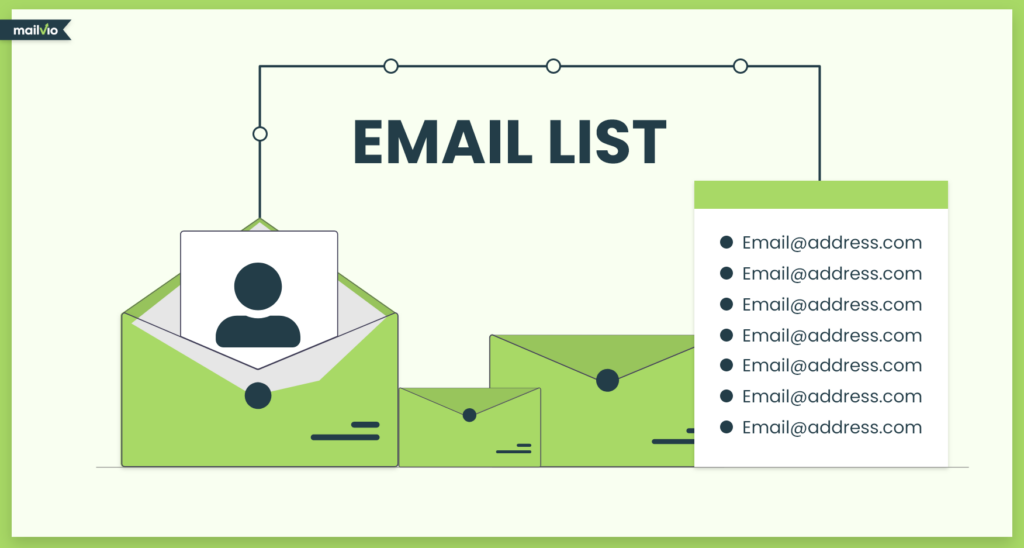20 New Pieces Of Advice For Picking Email List Sellers
What Factors Should I Consider When Purchasing Cpa Email Lists?If you are considering purchasing a CPA (Certified Public Accountant) email list, you must look at a few key elements to ensure that the list you purchase is of the highest quality, compliant to legal standards and pertinent to your marketing goals. The following are the things to look out for. The Quality of Data and the Accuracy
Source of information: Find out the source of the list. Usually, reputable providers gather their data from reliable sources, such as trade associations, directories of professionals, databases. Avoid lists generated by scraping data or using unreliable techniques, as these might contain outdated or inaccurate data.
Verification process: Examine to see if your email list has been verified recently. This will lower bounce rates, and also ensure that the email addresses are legitimate. Ask when the list is cleaned and updated, as CPAs are often changing jobs or firms.
Segmentation and Filters: A good CPA list should include different ways to segment, including geographical location (city or state or country) or industry specialty (e.g., auditing, taxation or financial planning) years of experience, or firm size. Your campaigns can be more relevant through targeted targeting.
2. Legal Regulations
Data Privacy Laws â Ensure your email list is compliant with privacy laws governing data such as the General Data Protection Regulation, the California Consumer Privacy Act or any other local laws. Lists should contain only email addresses that have been legally obtained, and with consent.
Compliance with the CANSPAM Act The list of addresses used in U.S. commercial email campaigns should be compliant to the CANSPAM Act. It is crucial to offer opt-out options and refrain from using misleading subject lines or other content. Non-compliance with the law can lead to fines or legal concerns.
Opt In Consent: Be sure you've gotten the email address by way of an opt-in consent. That is, recipients who have opted in consent to being contacted by marketers from third parties. This decreases the chance of complaints about spam while also increasing engagement.
3. Provider Reputation
Do thorough research on the reputation of a service. Review customer testimonials, case studies and reviews to gain a sense about what customers who have used the service previously had to say about their experience. Established providers who have a proven track record are more likely than not to provide quality and reliable data.
Transparency. The provider should clearly state how and when the data is updated. It's a red flag when the service provider isn't able to describe their method in a clear manner.
Customer Support: If you require assistance with customizing your list, troubleshooting and knowing the compliance requirements, it is important to provide a reliable customer support. A good customer support service can help you save time and money during your campaign.
4. Cost and ROI
Pricing Models. Providers offer different pricing models. Some charge for each contact, while others offer per-contact fees or a subscription. Examine the costs in relation to the expected ROI, and balance price with the standard of the selection.
Check out the refund policy. If you find that a significant number of your emails are not correct or invalid, you may be entitled to a complete or partial refund. Guarantees give you confidence.
Do not solely concentrate on price. If the list is of poor quality, a list with a lower price might look appealing, but it may result in low engagement rates or a high bounce rates. You should consider lists that provide accurate data and segmentation.
5. Data Usage, Ownership Access, and Ownership
Single-Use or Multiple-Use. Multiple-Use: Clarify whether you're purchasing the list only to use for a specific time or whether you own the information and are able to use it for ongoing campaigns. While a single-use list might be less expensive, owning the list allows you to conduct longer-term campaigns.
Shared and exclusive. Exclusive lists: Find out if the email list is exclusively yours or shared with multiple buyers. Shared Lists: Determine if the list of email addresses is exclusive to the owner or shared with several buyers. Lists shared with others could cause audience exhaustion if they have received a lot of marketing emails.
6. Data Integration and Format
CRM Compatibility: Make sure that the list of contacts is provided to you in a format that's compatible with your CRM, email marketing software or any other program. This allows for the easy transfer and management of the information.
Ease-of-Use: Evaluate the ease with how data can be segmented, managed and integrated in your system. A well-organized database will improve the effectiveness of targeting and personalization.
7. Ethical concerns
Relevance and value of content: Because CPAs work hard and are a lot of work, it is crucial to provide content that is both relevant and valuable. Avoid sending irrelevant messages that could damage your reputation or lead to more spam complaints.
Avoid over-emailing: Be aware of how frequently you email those on your list. Unsubscriptions could result in complaints about spam and unsubscribes that could damage the reputation of the sender.
Conclusion
Prioritize data quality legal compliance, as well as the reputation of the company when you purchase a CPA list to ensure that your investment is worth it. Segmentation, targeting, and ethical practice will increase engagement and maximize ROI while protecting the image of your company. Follow the best cpa email list for more advice.

What Factors Should I Be Thinking About When Purchasing An Urgentcare Email List?
It's crucial to think about a number of aspects when buying an email list to provide urgent treatment. This will ensure that the list you purchase is up-to-date and compliant with the law and appropriate to the goals of marketing. Here are some important considerations. Quality of data and accuracy
Source of data: Verify that the company is getting the data they need from reliable sources like medical associations or healthcare databases. Avoid lists generated by scraping data or unreliable means as they could contain incorrect and outdated information.
Verification Process Verification Process - Confirm that email lists are regularly updated and checked. A reliable provider will have a rigorous verification process to remove inactive, invalid, or duplicate email addresses. This process ensures an excellent delivery rate and lowers bounce rate.
Segmentation and Targeting: The list must include choices for segmentation like the location (city province, town, region), the size of the facility (e.g. pediatrics, diagnostics) or the role of decision-makers (e.g. medical directors, managers). Targeted lists increase the engagement rate and improve relevance.
2. Legal Regulations
Data Privacy Laws: Ensure that the list complies with relevant laws on data protection, like the General Data Protection Regulation (GDPR) in Europe as well as the California Consumer Privacy Act (CCPA) in the U.S., and other local regulations. That means that emails must be collected and processed legally with the consent of all parties who are involved.
CAN SPAM Act: In the U.S.A. All email marketing campaigns are subject to the CAN SPAM Act. It is essential to include your email address along with a clear "opt-out" mechanism. Failure to comply could result in fines or damage to your image of your brand.
Opt-in Consent: Make sure that all email addresses in the list have been obtained with explicit permission. This means that the recipients have signed up to receive marketing messages. This decreases the risk of receiving spam complaints or legal issues.
3. Provider Reputation
Established Providers: Choose a firm that has a history of sending out email lists that have high quality and compliance. Check testimonials, case studies, and reviews from previous clients to determine the company's client satisfaction.
Transparency: Providers must be transparent in the way they got their information and when it is updated. It could be an indication of poor data if the service provider fails to provide clear answers regarding their method of data collection.
Customer Support: A strong customer support team is crucial if you require assistance in tackling technical issues and list customization, or even compliance. A responsive provider can assist you in gaining the maximum benefit from your email list.
4. Cost and Return On Investment (ROI).
Pricing models Email list providers provide a variety of pricing structures including flat fees or pay-per-contact. Pricing models must be evaluated against your marketing budget and the ROI goals. The price of the list must be balanced against the accuracy and relevancy of the information.
Refund or Replacement policy A reputable supplier usually offers the option of a refund or replacement when a significant portion of email addresses are invalid or is not deliverable. Be sure to understand the policy's terms before purchasing.
Cost-effective: Concentrate on lists that are valuable by using accurate information and segmentation. Investing in a high-quality list increases engagement and will yield a higher ROI from your investment.
5. Data Ownership and Usage
Single-Use vs. Multi Use: Identify whether the list can be utilized for a single campaign or a variety of campaigns. Lists which allow for multiple uses will provide more value. This is especially true if you are planning to conduct ongoing campaigns.
Exclusive vs. Shared Lists Identify if this list is yours alone or is shared among other buyers. Shared lists could lead to list fatigue as recipients may receive numerous marketing messages. Engagement rates will decline.
6. Data Integration and Format
Check for CRM compatibility: Make sure the email list is delivered in a format that is compatible with your customer relationship management (CRM) or email marketing platform, such as CSV or Excel. This allows for a smooth and quick integration.
Easy-to-use: The list is designed to be user-friendly, and you can segment it based on your needs. A well-organized list can increase the effectiveness of personalization and targeting.
7. Ethical Aspects
Relevance and worth of content The importance and value of content professionals, which means the information you share with them should be helpful and pertinent. Adapt your message to the needs of your audience. For example when you're promoting medical equipment, products or technologies that align with operations in urgent care make sure you tailor your message. Sending irrelevant content could harm your brand's image and decrease engagement.
Reduce the frequency of your emails. Spam complaints can be triggered through sending too many emails, or messages that are not required.
The conclusion of the article is:
Focus on the data accuracy, the legal compliance, and the credibility of your provider when buying an email list to provide urgent care. Be sure that the list is regularly updated and segmented and is also in compliance with privacy regulations. It is possible to increase the number of people who are on it by investing in a well-targeted, high-quality list and sending relevant content. Check out the expert urgent care email list for site advice.
